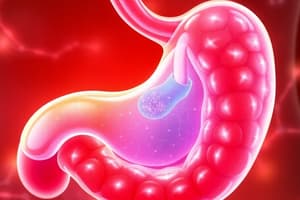Podcast
Questions and Answers
Which type of diabetes is characterized primarily by insulin deficiency?
Which type of diabetes is characterized primarily by insulin deficiency?
- Gestational diabetes
- Type 2 diabetes
- Type 1 diabetes (correct)
- Secondary diabetes
Chronic hyperglycaemia is the primary characteristic of diabetes mellitus.
Chronic hyperglycaemia is the primary characteristic of diabetes mellitus.
True (A)
What hormone is primarily responsible for lowering blood glucose levels?
What hormone is primarily responsible for lowering blood glucose levels?
Insulin
Diabetes mellitus can be classified broadly into ____, Type 2 diabetes, and secondary diabetes.
Diabetes mellitus can be classified broadly into ____, Type 2 diabetes, and secondary diabetes.
Match the following hormones with their functions in glucose regulation:
Match the following hormones with their functions in glucose regulation:
What percentage of global deaths in 2017 were attributed to diabetes?
What percentage of global deaths in 2017 were attributed to diabetes?
The normal range for plasma glucose levels is between 3.5-6 mmol/L.
The normal range for plasma glucose levels is between 3.5-6 mmol/L.
Identify one source of glucose derived from dietary sources.
Identify one source of glucose derived from dietary sources.
Which type of glucose transporter is insulin-dependent?
Which type of glucose transporter is insulin-dependent?
GLUT-5 is primarily responsible for transporting glucose into muscle and adipose tissue.
GLUT-5 is primarily responsible for transporting glucose into muscle and adipose tissue.
What is gluconeogenesis?
What is gluconeogenesis?
Glycogen serves as stored energy in the liver and __________ muscle.
Glycogen serves as stored energy in the liver and __________ muscle.
Which glucose transporter is specifically a fructose transporter?
Which glucose transporter is specifically a fructose transporter?
Name two conditions that can be life-threatening due to glucose imbalances.
Name two conditions that can be life-threatening due to glucose imbalances.
GLUT-2 is an insulin-dependent glucose transporter found in the liver and pancreatic beta cells.
GLUT-2 is an insulin-dependent glucose transporter found in the liver and pancreatic beta cells.
Match the following glucose transporters with their corresponding tissues:
Match the following glucose transporters with their corresponding tissues:
What is the primary function of glycogenolysis?
What is the primary function of glycogenolysis?
Insulin decreases plasma glucose levels.
Insulin decreases plasma glucose levels.
Who were the scientists credited with the discovery of insulin?
Who were the scientists credited with the discovery of insulin?
Glycogen is stored primarily in the ______ and ______.
Glycogen is stored primarily in the ______ and ______.
Which hormone primarily increases plasma glucose levels?
Which hormone primarily increases plasma glucose levels?
Insulin was discovered after observations were made in diabetic dogs.
Insulin was discovered after observations were made in diabetic dogs.
Match the following hormones with their effects on blood glucose levels:
Match the following hormones with their effects on blood glucose levels:
What is the primary action of glucokinase within cells when glucose enters?
What is the primary action of glucokinase within cells when glucose enters?
What stimulates the opening of voltage-gated calcium channels?
What stimulates the opening of voltage-gated calcium channels?
Insulin secretion occurs in a uniphasic manner.
Insulin secretion occurs in a uniphasic manner.
Name one type of molecule that can stimulate insulin secretion.
Name one type of molecule that can stimulate insulin secretion.
The action of insulin promotes the synthesis of _____ from excess glucose.
The action of insulin promotes the synthesis of _____ from excess glucose.
Which process is promoted by insulin in the liver?
Which process is promoted by insulin in the liver?
Match the actions of insulin with their corresponding effects:
Match the actions of insulin with their corresponding effects:
Insulin has predominantly catabolic effects on metabolism.
Insulin has predominantly catabolic effects on metabolism.
What receptor does insulin bind to on target cells?
What receptor does insulin bind to on target cells?
What state does glucagon favor?
What state does glucagon favor?
Insulin deficiency is a characteristic of Type 2 diabetes.
Insulin deficiency is a characteristic of Type 2 diabetes.
What are incretins and their role in glucose homeostasis?
What are incretins and their role in glucose homeostasis?
The autoimmune destruction of β-cells leads to __________ diabetes.
The autoimmune destruction of β-cells leads to __________ diabetes.
Match the diabetes types with their characteristics:
Match the diabetes types with their characteristics:
Which hormone is directly inhibited by cortisol?
Which hormone is directly inhibited by cortisol?
Catecholamines promote insulin secretion.
Catecholamines promote insulin secretion.
Chronic hyperglycaemia is characteristic of __________ Mellitus.
Chronic hyperglycaemia is characteristic of __________ Mellitus.
Flashcards are hidden until you start studying
Study Notes
Glucose Homeostasis
- The brain requires glucose as its primary energy source.
- High glucose levels can damage cellular proteins.
- Hypoglycaemia and hyperglycaemia can be life-threatening.
- Glucose homeostasis balances glucose delivery and demand.
- The system regulates glucose in response to changes in glucose delivery (fed vs. fasted) and demand (exercise/physiological stress).
- Gluconeogenesis is the process of creating glucose from molecules such as lactate, glycerol, glutamine and alanine.
- Glycogen is stored energy in the liver and skeletal muscle.
- Glycogenolysis is the process of breaking down glycogen to release glucose.
Hormones & Blood Glucose Regulation
- Insulin lowers blood glucose levels and is released from beta cells in the pancreas.
- Glucagon, catecholamines, cortisol, free fatty acids and growth hormone increase blood glucose levels.
Insulin
- Insulin was identified as pancreatic in origin in the early 1900s.
- Frederick Banting and Charles Best injected pancreatic extract into diabetic dogs, which improved their condition.
- In 1922, the first patient was successfully treated with refined pancreatic extract.
- Insulin secretion is biphasic with an initial surge followed by a plateau phase that persists as long as blood glucose levels are high.
- Insulin secretion is stimulated by an increase in plasma glucose, amino acids, GI hormones, glucagon, growth hormone and cortisol.
- Insulin acts by binding to a receptor on the target cell membrane and activating secondary pathways.
- Insulin is predominantly anabolic.
Actions of Insulin on Glucose
- Insulin facilitates glucose transport into cells.
- It inactivates liver phosphorylase and increases the activity of glucokinase, promoting glucose storage in the liver.
- Insulin promotes glycogen synthesis by increasing the action of glycogen synthase.
- It inhibits gluconeogenesis by decreasing the activity of liver enzymes and by decreasing available precursors like amino acids.
Actions of Insulin on Fats
- Insulin promotes fatty acid synthesis.
- It promotes the storage of fat in adipose cells.
- Insulin inhibits the release of free fatty acids from adipose tissue and promotes glucose transport into fat cells.
Insulin vs Glucagon
- Insulin is associated with an anabolic state.
- Glucagon is associated with a catabolic state.
Other Influencers in Glucose Homeostasis
- Glucagon-Like Peptide (GLP) and Gastric Inhibitory Peptide (GIP), also known as 'incretins', are produced in the small intestine and augment insulin secretion.
- Cortisol and growth hormone promote gluconeogenesis, inhibit glucose transport, and can directly inhibit insulin secretion.
- Catecholamines, released during stress, promote glucagon release, inhibit insulin secretion, and stimulate sympathetic neurons that innervate the pancreatic islets.
Diabetes Mellitus
- Diabetes Mellitus is characterized by chronic hyperglycaemia.
- It is caused by either insulin deficiency or insulin resistance.
- It is commonly divided into:
- Type 1 diabetes: Insulin deficiency caused by an autoimmune destruction of beta cells.
- Type 2 diabetes: Insulin resistance +/- less severe insulin deficiency.
- Secondary diabetes: Acquired causes of diabetes, such as those caused by drugs or genetic defects.
- Impaired fasting glycaemia and impaired glucose tolerance are pre-diabetic conditions.
Type 1 Diabetes Mellitus
- Type 1 diabetes is characterized by the autoimmune destruction of beta cells, leading to complete insulin deficiency.
- Presence of antibodies to islet cells can precede the onset of the disease by years.
- Often asymptomatic in the initial stages.
- Symptoms appear when the remaining beta cells can no longer meet the body’s insulin needs.
- Represents 5-10% of all diabetes cases.
- Typically presents in children and young adults.
- Genetic susceptibility is a factor.
Studying That Suits You
Use AI to generate personalized quizzes and flashcards to suit your learning preferences.



